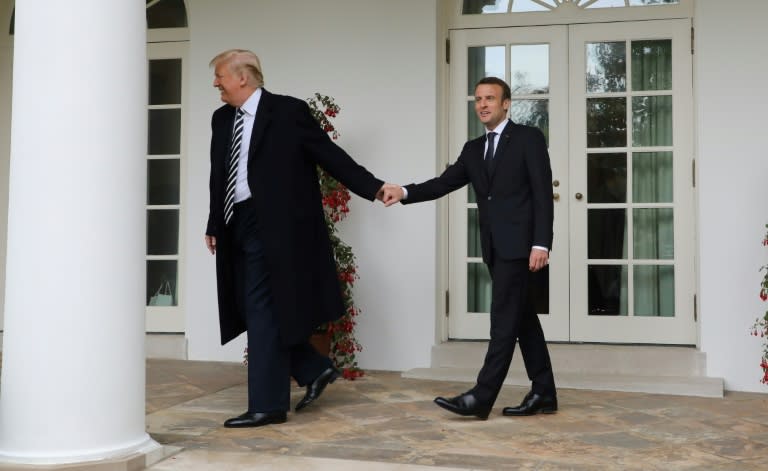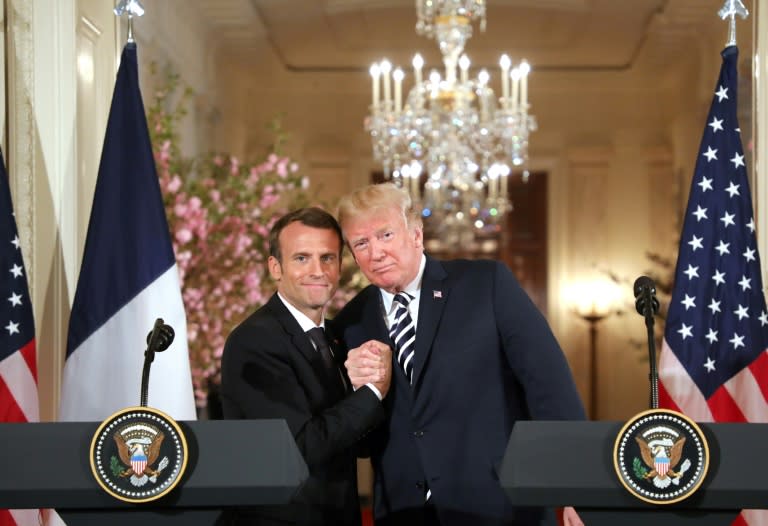The tamer tamed -- who wins in the Trump-Macron friendship?
Emmanuel Macron's state visit to Washington was always going to be a charm offensive -- aimed at winning key policy concessions from his powerful host. But after three days of back-slapping, hugs and handshakes, it was Donald Trump who appeared to have led the diplomatic dance -- while giving little ground to his French guest. While the 40-year-old Macron himself can be tactile with his guests, he often seemed wrong-footed by the eager displays of affection from the 71-year-old US president -- to the point of embarrassment. Setting the tone, an astonishing shot of the US president dragging his fellow head of state by the hand -- as a father might a son -- made the front page of The Washington Post midway through the visit. Many observers judged the scene humiliating for Macron, the body language seeming to bode ill for France's ability to influence US policy on key areas of disagreement, most crucially Iran -- which was the stated aim of Macron's high-profile trip. The optics were the exact opposite of the impression given in May 2017, when the young French leader sparked an admiring buzz by gripping Trump in a white-knuckled handshake as they first met. Back then the French leader played along with the temptation to read diplomatic meaning into the gesture. "You have to show you will not make small concessions, even symbolic ones" he said at the time. - 'L'affaire dandruff' - Fast forward to Tuesday in the Oval Office, where the US leader leaned over -- with the eyes of the world upon them -- to brush what he said was a fleck of "dandruff" from Macron's jacket. "We have to make him perfect," Trump said, drawing uneasy laughter from his guest. "He is perfect." The sequence -- replayed on loop around the globe -- provided instant fodder to late-night comedy shows who have reveled in the seeming "bromance." "The Daily Show" on Comedy Central ran a montage of their interactions -- smiles exchanged, hand brushing hand -- as a mock silent movie set to a romantic soundtrack. But their body language was also being analyzed for serious clues as to the power play. "On this trip, Trump is the alpha -- and Macron has settled into obedience," wrote the Post in an editorial on what it dubbed "L'affaire dandruff," judging Macron to have emerged the loser of a year-long arm-wrestle for dominance. The New York Times and Germany's Der Spiegel both gave Macron more credit for investing in the much-vaunted friendship in a bid to win important concessions -- but both were doubtful of his chance for success. "Macron is using the relationship to cast himself as the leader of Europe, and restore France's place on the international stage," wrote Der Spiegel. "But it is unclear if this can have an impact on Trump." Thomas Snegaroff, a French expert on US politics and history, was just as skeptical. "For the past two days, people have been marveling at Macron's talent in figuring out that you need to endlessly flatter Trump to get your way with him," he tweeted. "My feeling is that it is the opposite." Same message from Corentin Sellin, a French historian specialized in US politics, who observed "a subtle but growing condescension from #Trump towards president #Macron" and, in fine, a setback for the president's outreach to the United States. Observers were quick to draw the parallel with the relationship between George W. Bush and Britain's former premier Tony Blair -- who earned the moniker of "lapdog" for his efforts to woo an unpopular American leader. The New Yorker argued that Trump -- having alienated so many fellow statesman -- "makes a world leader who can forge some points of agreement with him look like less of a lapdog than an elephant tamer." But it is a sizeable gamble for Macron, who if he ends up with little to show for his efforts, risks appearing less like an elephant tamer than a tame beast himself. - Sharper tone - The true test of this strategy, argued Sellin, will be Trump's decision on May 12 -- and whether or not he decides to walk away from the 2015 Iran nuclear deal, despite Macron's entreaties for Washington to remain on board. "If, after the hour we have spent together, the United States had said we are tearing up the agreement, while France wished to defend it, then our friendship would serve no purpose," Macron declared at the White House on Tuesday. "But we have found a way to evolve, to take into consideration what is important for each of our countries." On the final day of his visit -- with headlines at home questioning his strategy towards Trump -- Macron appeared to course correct. Addressing the US Congress, he challenged many aspects of the "America First" agenda that has defined Trump's foreign policy, rejecting isolationism, aggressive trade tactics and inaction on climate change, and calling for the United States to renew with multilateralism. Macron's feisty speech won him plaudits from Trump's critics -- both Democrat and Republican -- and will doubtless go some way towards reassuring domestic audiences of his divergences with Trump, be it on global warming or the threat from "excessive nationalism." But while the Trump-Macron friendship has certainly left a mark on US political comedy -- regarding its effect on US policy, the jury is still out.




